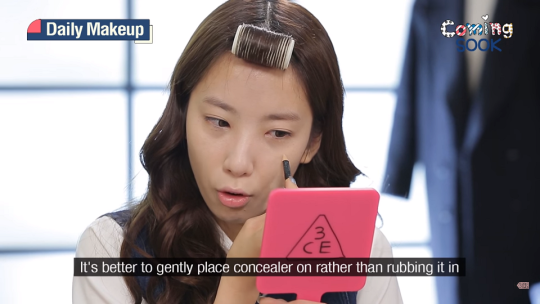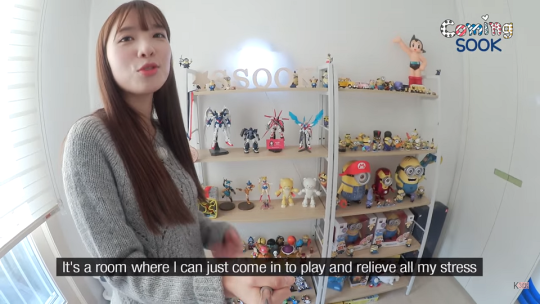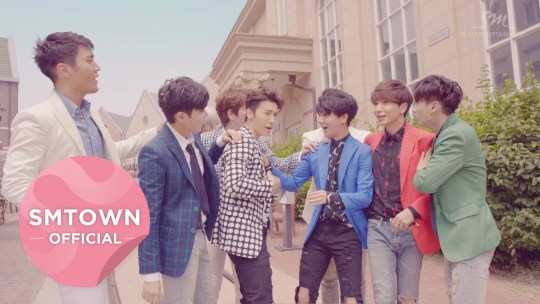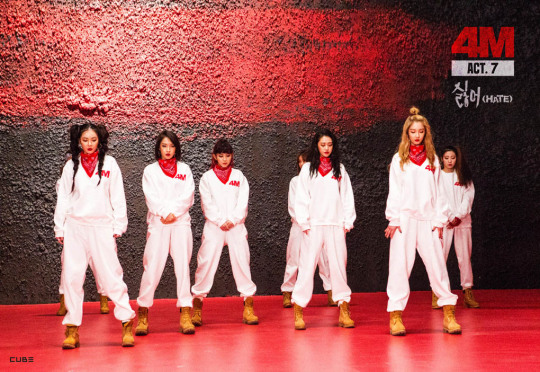KStyleTV
– Coming Sook Episodes Playlist
Reviewed on February 28, 2016
Rainbow’s
Jisook – Coming Sook: Jisook’s Fantastic Life

Personal
Message: Although
Stellar’s “Sting” is once again delayed, I have decided to alter the review
schedule as February is coming to a quick end. Through finishing the month with
show reviews or shorter song reviews, the blog will have at least around four
to five reviews, and that will satisfy my personal goal—even if to the lowest
degree. With March, I do plan to continue the current path: to review only
artists who have yet to be reviewed at all. However, MAMAMOO’s latest comeback
of “You’re the Best at Everything” will be heavily contesting that plan, and
similarly, if Fiestar and SPICA have their comebacks within that month. What
will hopefully occur, though, is that during my one-week Spring Break, I will
catch up on multiple reviews. Thus, recent comebacks, regardless of artists,
may still be covered. On topic, for this review, it is not on a song or album:
it is on a short reality show starring Rainbow’s beloved Jisook. “Coming Sook:
Jisook’s Fantastic Life” (I will refer to it as “Coming Sook”) has admittedly
been a show I have been “binge watching.” That is understandable, however.
Jisook is, after all, truly a “happy virus” and “vitamin”; watching her show
will put anyone in a great mood regardless of how they felt prior.
Sharing how I happened to come
across Jisook’s contagious virus, after reviewing Rainbow’s
“Whoo,” I decided to check out the group since, as stated in that review, I
was quite unfamiliar with them and thus desired to know the group for more than
their music. Somehow, Jisook’s show was the first video I came across. Needless
to say, though, I am exceptionally grateful for this outcome. Jisook has
utterly infatuated me, and after watching her videos, I will definitely look
more into Rainbow—both with songs and videos. Jisook is sincerely, as mentioned
above, a “vitamin.” The only other idol I know that possesses equal high level
of cheerfulness would be Dal Shabet’s Serri, but point is, both ladies are incredibly
positive. I personally aspire to also be full of love and joy like the two, and
admittedly, Jisook is someone I now also look up to. She showcases my personal
idea of a “perfect” life. (However, MAMAMOO’s Solar is my main role model; I
strive to be exactly like her in every possible way.)
For one, Jisook greatly prioritizes
happiness and laughter—two very crucial aspects I would argue that are vital
for an enjoyable life. On that line of thinking, she also cherishes love and
affection for her friends/members, and likewise, those are also essential
aspects to a good life. In fact, it is debatable that what the world needs more
of is just that: love for others and self. And of course, health and hard work
are also valuable points that Jisook lives up to, such as with dedicating
herself to her hobbies to release stress, and for the obvious example, working
hard in her career as an idol. Lastly, on a materialistic level, she has the
best house one could ask for: not a mansion, but rather, a pretty, organized
and comfortable smaller house. Although I do not wish for readers to interpret
the prior and following words as “the right way” to live, I am against
materialistic living (such as prioritizing money as the source of happiness;
for examples, finding joy in owning the most expensive clothing and makeup
products). Instead, at most for a materialistic lifestyle, money should be
orientated towards (after basic living needs) items that help bring emotional
wealth. Returning to the example of owning the most expensive makeup products,
the joy from such should not stem from the value of the makeup product; rather,
the joy in that has to be within the makeup itself. But as said, to each her
own; as long as he finds his own source of happiness and shares love and
compassion, then all is well.
Overall, I do greatly envy and
aspire to have Jisook’s lifestyle and am very excited to begin my own
independent life in a few more years—though “independent” is not quite true as
I do plan, at the least, to live with a dog. (As shared before, I would love to
adopt a child if financially and emotionally capable, even if as a single
parent.) Although unlike Jisook I would not have a career as an idol since my singing, dancing, and I lack the
appearance would cause visual and audio related injuries
intelligence and physical abilities. I would be extremely more content with teaching
high school freshmen students with English and dedicating myself to loving
friends, child and dog, makeup and fashion, exercise, hobbies, and so forth.
And jocularly and randomly to share, I have strongly desired a dog lately. I
cannot be blamed though; as the saying goes: “dogs are woman’s best friend,”
after all. (And if I am correct, a few may suddenly claim that the phrase is
wrong as it should be “man’s best friend.” I will discuss in depth this topic
of “gendered” language below.) All in all, Jisook is an amazing human and I
will strive to lead a cheerful, intellectual, caring, loving and compassionate
life as her.
Now, to discuss my prior use of “woman’s
best friend” (feel free to skip to the review now—though to confess, I have
sorely missed saying that very phrase), there is one topic I have surprisingly
never discussed at all before on the blog: the importance of language, and more
specifically, how language is reflective of social power—examples being
“gendered” language or “heterosexist” language. Nevertheless, it is shocking to
have never discussed this. Given my personal passion for English and sociology
(and teaching, as many would guess), this specific topic of language should
have been one discussed ages ago. It is, after all, the literal intersection of
the two subjects: seeing how sociology (social aspects and topics, etc.) applies
to language (words, daily communication, language arts, etc.) itself. Returning
to the phrase of “dog is woman’s best friend,” many would argue that the proper
way to state such is to change the pronoun of “woman” to “man.” After all, there
is no harm to saying “man’s best friend” or even other phrases such as
“mankind” or “man-made.” Words cannot ever be truly influential. This is why
that vapid saying exists: “sticks and stones may break my bones, but words will
never hurt me.” Unfortunately, though there is no direct harm such as jabbing a
knife into someone, arguably that level of damage is still true with words: it
just happens socially rather than physically.
Language is more than pure
communication, such as with day-to-day conversations; language is more than
beautiful art that can come from great poetry; language is more than mastering
grammar, vocabulary, and argumentative essay formats. Language is, in addition
to the listed examples, also reflective of social equality and power or the
lack thereof. What we say or do not say carries significant social weight, and
from there then are words translated into physical, affecting actions. In other
words, views on gender will influence language, and as a result, language will
influence views on gender. Views on race will influence language, and
similarly, the opposite occurs. There is a cycle with language and social
aspects and thus, it is critical to realize the connection between the two
subjects. Specifically with this digression, although I certainly do equally
hold important the language arts side to language, or the semiotics and linguistic
side to language, I do wish to discuss the sociological aspect to language. And
to begin, “human’s best friend,” a dog, will provide an example.
The largest issue with “man’s best
friend” is it contributes to an underlying assumption many societies have: that
males are automatically the default of everything. To very extreme points,
there are those who even believe that females are “inverses” or “castrated”
males, even though females are simply females—their own sex (and equally
valuable ones; every sex—male, female, intersex—are indeed all worthy). (And,
assuming my biology is not that awful, the mentioned idea is easily disproved
as, scientifically, every human starts out as female. So, if the prior idea is
to be used, it is not females that are “inversed” males, but instead, it is
males are “inversed” females.) On topic, already, there should be a noticeable
issue with having males centered as normal. As a copious amount of reviews have
discussed, males being deemed at the center when, equally and equitably it
should be both sexes, leads to various issues. Androcentrism is a direct
example: the idea that masculinity is the normal for how to think and act. For
a visual example, think of how it is permissible for women to
“cross-dress”—such as wearing a suit—and conversely, atrocious if a man
“cross-dresses”—such as applying BB cream and eyeliner. (Though there are
cultural differences to account for. Yes, in some cultures males using makeup
is nothing surprising versus in, for example, Western cultures. Nevertheless
the same idea holds when it comes to, for a simple example, whether crying is
allowed for males.) This disparity is due to androcentrism: that masculinity is
always accepted, and anything remotely feminine is of lower status and is,
especially in males, never allowed.
Before getting off track, in regards
to language itself, it is important to pay attention to as it provides
reinforcement to social ideas. When societies constantly reiterate “dog is
man’s best friend” or that cars are “man-made,” what messages are being said?
To clarify, I do not wish to antagonize people who do say those phrases. Absolutely,
I do believe that when a person says those phrases, they are connoting: “dog is
anyone’s—man or woman—best friend” and “man-made is something made by
humans—whether man or woman as both are capable of being engineers.” In truth,
many people who say those phrases and other gendered phrases are most likely
very much opposed to sexism. Nevertheless, what I desire to emphasize is that,
intended or not, using gendered language has gendered consequences—again, even
if unintended. Language is more than “colloquial.” By using phrases that
include only males on the surface, no matter how benevolent the intention,
there will be repercussions. The following example might highlight such.
Say that I went to the doctor and
that there is awful news: I am dying from Boa-itis, a rare disease caused by
being overly obsessed with SPICA’s amazing leader. (Alright I admit this is
bad. I will directly apologize for this joke.) Searching for comfort, I share
to my close friend that my doctor revealed to me horrible results. Knowing my
friend, she might eventually reply: “What did he say?” Now while Boa-itis may
not be true despite how, if this were to occur, I would
Boa has halted my heart a few times
forget my dying state and reply with a sharp: “My doctor is a woman; a she; a
female” (and that is true; my doctor is actually a woman). Notice, though, the
language instilled there: assumption that the doctor is a male. During these
cases, what should be said is “they”—even though, yes, it is plural (but
dictionaries now do define it as both singular and plural). Nevertheless, when
this situation occurs (and it does tend to be somewhat frequent), saying “they”
is the overall best route to take. Maintaining gender-equal and gender-neutral
language is what has to occur if gender equality in an even larger form is to
take place. After all, how can society ever accept amazingly skilled male
makeup artists and hair stylists if everyone keeps saying “she” in reference to
those jobs?
At this point, one may have a keen
reply to the prior example: that it is not language that is influential, but
rather, ideas that then translate to language—and that is it; no cycling occurs.
Perhaps we tend to say “he” for doctors not because of language itself, but
rather because we have a socialized idea of who is a doctor and thus merely
state that. That is certainly a true point, but again, the recycling of
gendered language is important to hold in mind: this is why it is best to say
“they” if the pronoun’s gender is unknown. If it is a held common belief that
doctors are males, breaking down that assumption is to break down the language
involved: using “she” or “they” instead of an automatic “he” when one discusses
“doctor.” And furthermore, on this note, there is one example of gendered
language itself being quite influential: the use of “guys.”
Many readers may now be questioning
their own use of the words or synthesizing justifiable reasons for using
“guys,” but as many may now think after reading the prior paragraphs, the use
of “guys” is the one of the most common examples of gendered language in
English (or at least American society). That said, to reiterate an older point,
using gendered language is not based on intentions; using “guys” does not make
one sexist. Not even remotely. Rather, “guys” has been incorporated into
standard English language—akin to “mankind” for example—and that is what needs
to be challenged. Using “guys” is questionable as it does subtly imply that
males can represent females when that should not be the case, and even if that
should be allowed for whatever reason, the fact that the opposite cannot occur
showcases even more inequality. Take the following example. I can refer to a
group of females as “guys,” and that is acceptable. In fact, that is “normal”
and anything otherwise may seem absurd. Strangely enough, however, should I
refer to a group of males as “gals,” many would find it absurd. To some, even
offensive. And yet, “guys” to a group of females is not insulting as the word
has become normalized despite how “guys” does indeed refer to males. Even if colloquially
“guys” has become connoting of both genders, again as highlighted, should this
be accepted, then “gals” has to also be equally accepted, but as unveiled that
is not the case at all.
In terms of solutions, glancing at
other languages may provide a few answers, and in addition, may showcase how
absurd using “guys” truly is. Cantonese and Korean will be used as examples. In
both of the mentioned languages, from my understanding, “guys” is not used to
refer to any cohort of people; “guys” is used to refer to, as expected, a group
of males—a group of boys, men, males. Only in English (or at least American
society) is “guys,” a word that does indicate only males, used to represent any
group of people regardless of sex. Now, for a predicted disagreement, one may
claim that “guys” is in fact used in Korean or Cantonese to refer to a group of
people. A video subtitle said so. As a response, this is where “direct
translation”—or lack thereof—becomes an issue. (And as a subtitler, I do try to
directly translate whenever possible for this very reason. I wish to respect
what the language itself says.) From my understanding (as said before, though I
am not fluent in Korean, I am confident enough in this regard, and with
Cantonese I am rather knowledgeable with it), the literal word of “guys” in both
refer to solely males. It would be silly to attempt to say “guys” in reference
to a group of people. Instead, for what is said, common ways to address a group
are “everyone” in Korean or “they/they all” in Cantonese. Nonetheless, however,
as disclosed neither Korean or Cantonese follow the unique form of how English’s
“guys” can be used for both.
Clarifying, this is not in any way
to downgrade English and American culture (I am American after all) or to
praise Korean and Chinese language and culture as better. That would be
absolutely pathetic and, from this perspective, arguably racist and for sure
ethnocentric (since, as reviews have discussed, racism is based on “dominant
group,” and with writing in this perspective of Chinese and Korean culture, it
would appear I am bashing non-Korean and non-Chinese cultures). Point is, it is
true that in Korean and Cantonese “guys” is not flexible: this is the point I
wish to emphasize. In English, the word “guys” is indeed rooted as males only—akin
to how “gals” is rooted as females only. Thus, with that holding true, “guys”
in English should not be used to refer to both males and females; it should
refer to only males. If one is to refer to both females and males, more
inclusive terms are always available: “they,” “you all,” “everyone,” and
perhaps for the best solution, “guys and gals” or “gals and guys.” All in all, “guys”
is not worth using unless if it is exactly intended: to refer to a group of
guys.
And so, there may now be multiple
responses. Readers may feel guilty, annoyed, or currently preparing methods of
strangling me for being “overly sensitive” to words. Repeating the earlier
point, this is not to accuse nor cause guilt; this is to bring awareness.
Truthfully, whether my views are accepted or not does not matter to me: what
matters is that readers are critically thinking about my position. Perhaps
using “guys” or “mankind” are indeed acceptable and even empowering to every
sex. Or perhaps that using “guys” should be allowed but that we should now also
start using “gals” instead of utterly removing the current way we use “guys.”
No matter the response and stance readers have, what matters is why they have
their specific stances. Through critically analyzing what I have argued, that
is what I hope for as, if social inequalities are to be solved, mature and open
discussions have to occur. Directly sharing what my own take is, I personally
favor three options: using “all”; using “gals and guys” and “guys and gals”;
and, using “she” and “he” individually yet equally (such as by saying “it’s every
woman for herself; he needs to find his own cup of coffee”)—though there is the
issue in the latter two examples of not including intersex people for example.
In the end, as I encourage in
readers, it is about equality and equity: having love, respect, compassion, and
understanding for everyone regardless of their social attributes, be it
religious affiliation, gender, race, class, sexual orientation, able-bodied or
disabled-bodied, and more. With this digression, I do urge readers to bear in mind
using inclusive language; language that includes people no matter their gender
or sexual orientation or race, and so on. Language has significant social
consequences, but thankfully, language is in control by a vast majority of
people. Using “you all” instead of “you guys” may indeed help contribute to
gender equality in the long run, and so will using “they” instead of
automatically assuming that an engineer is a “he” or that a nurse is a “she.”
After all, every human deserves understanding and compassion, and I can attest
with full confidence that Jisook would agree. Let us all be a bit more like
Jisook: loving, caring, joyful, and thoughtful to others.
_______________________________________________________
Plot
Summary: Finally
beginning the review, admittedly I forgot how much fun it is to apply sociology
into (Korean) pop culture. Before entirely beginning, for technical notes, it
should be noted that any review that is not of a song can be considered a “bonus”
review: reviews that are meant to overall be fun and to provide variety from
just songs. Therefore, the following ratings I give are, in full honesty,
worthless; the numerical ratings hold minimal value in terms of giving insight
to the show. Juxtaposing song reviews to this review should reveal why: there
are only two ratings versus the abundant amount in song reviews. And certainly,
shows are as equally complex as songs and should indeed have much more
categories that just the current two I have. Optimistically, however, unlike
past show reviews, this time I am able to link the episodes themselves as this
short reality show is luckily entirely on YouTube—officially, to be specific.
(This means there will not be copyright removals, etc.) That said, I did link a
playlist, but I recommend starting with this episode: “Jisook’s New House Tour.” Reason being
that it provides background to both the show and Jisook herself. Also, for
readers who may hesitate to watch as Korean is not known to any degree, no
worries: there are English subtitles. This means that everyone reading is obliged to watch.
Jisook’s show is more important than caring for children, school work, going to
work—
Focusing on the actual review, as I
have not done so in a while for show reviews, for this one specifically, I do
in fact have pictures prepared for the Plot Summary. Before analyzing the show
itself, it is best to summarize the show so that readers have a general sense
of what “Coming Sook” is even about, and what better way to do such than
through visual aids?
“Coming Sook” is about Jisook, a
member from Rainbow, taking viewers along with her for some of her personal
activities. For one episode, she is touring viewers her new house, but for
others, she may be showing her hobbies or doing other miscellaneous activities,
such as adorably dressing up a dog. Furthermore, personal tips may be given,
such as—for what many men and women may desire to learn of—makeup. That, in
essence, is the show. Nothing more or less. The following pictures will
hopefully grant viewers quick ideas on the show’s aesthetics, format, and so
on. But there is now a very valid question: Why watch this? Is this show worth
an hour or so of my time? On the surface, this show would seem only enticing to
fans of Rainbow or Jisook, but the Analysis category will explain otherwise.

Jisook introducing her house.

Jisook sharing makeup tips. In this case, she is sharing her tip with concealer.

Woori and Hyunyoung, fellow members of Rainbow, visit Jisook’s house. Specifically here, they are looking around Jisook’s bedroom.

Jisook shares her playroom to viewers.

Jisook shares ways she does her hair.

Dali, a model dog, joins Jisook with making dog clothing.

With the assistance of a carpenter teacher, Jisook creates a wooden speaker for a fan.
_______________________________________________________
Overall
Value: 8/10 –
“Good; excellent”
– Entertainment Value: 9/10
– Structural Value: 7/10
_______________________________________________________
Analysis:
True, the structure to the show does
appear tedious: Jisook does one specific activity and viewers watch that for
seven or so minutes. Then the next episode is her doing another activity. Then
the same. Then the same. Then the same. The same. Same. How is that supposed to
be appealing in any form? Although the overarching structure is indeed the
same, the change in the content does provide enough variety to provide appeal
(and a score of seven). For example, the camera setup may be the same for when
Jisook explains her makeup or how she styles phone cases, but just the simple
change in topics allows for much variety. How Jisook explains and acts greatly
differs; she is not robotically going through her activities (more to be said
on this later). Furthermore, even in watching the various activities, all are
significantly different. Sure, Jisook is simply covering hobbies she does
versus, for example, one day going out to shop and the next day to a restaurant,
but the change in activity provides for a lot of content. Watching her share
hair styling tips and then later watching her play with a model dog, while systematically
similar, are exceptionally different in content itself, and that is what helps
provide appeal. Additionally, “Coming Sook” is not just of Jisook’s hobbies.
There are episodes where she is up-and-about with touring her house, cooking
snacks, or playing video games with her members and f(x)’s Amber.
As for what truly does make the show
entertaining in whole, even if the structure is slightly repetitive, Jisook is
entertaining in every sense possible: her words; her humor; her wits; her
actions; her goofiness; the list goes on. Jisook knows how to ace her job of
being an idol—a person whose job is to entertain others and to provide
excellent role modeling. At first, readers may be reaping entertainment through
the activities themselves, but after one or two episodes, that source switches:
Jisook herself becomes the main focus for the show’s entertainment. In fact, if
the show still continued, many would still be content even if the show ran low
on new ideas. Essentially, Jisook could be doing anything and she would somehow
make it all entertaining to watch. For all that is concerned, she could be
putting together a table or, for a drastic example, filing away paper and many
would still be invested in watching. It is not the activities that matter; it
is about Jisook doing said activities. She brings entertainment to the show—after
all, “Jisook” is in the show’s title. Overall, she truly is a hilarious and
joyous lady. I have yet to watch an episode without laughing, let alone not
smiling or squeezing the life out of my stuffed penguin at how cute the show
is.
Answering whether this show is worth
the time, I conclude a strong “yes.” The activities she does are entertaining
on their own to many people, but in addition, Jisook herself provides much
laughter and positivity. Every episode is memorable. She is truly a contagious “happy
virus” (laugh included) and can make an episode of watching paint dry turn out incredibly
funny and entertaining.
_______________________________________________________
Regurgitating what is usually but
sincerely said: thank you so much for reading. Whether read in full, skimmed, I
appreciate any given time to the blog and review. For readers interested in
upcoming reviews, I do apologize for not having a strong finish to this month. The
past days have been full of essays and studying for upcoming midterms, hence
why reviews have been slow. Or perhaps that this review being around 4,500
words could have been two reviews. But as said, March is where I have a week to
catch up on reviews, and thus, I will do my best to do so. Especially as song
reviews are becoming much more concise, there are a lot of expectations to be
able to review numerous songs within a month. For an idea as well, I also plan
to experiment with how often social digressions occur: rather than including
them in every review, I will only include them for every third review. This
way, various readers will have enjoyable content: those who desire both reviews
and social discussions receive their share, and readers moreover interested in
reviews have their share. And on my end, I have both sides of being able to
review more song and to write less, but to still engage with important topics
especially if relevant and elicited by a song.
For the next review, it may be
another show review to wrap up the month, or it may finally be Stellar’s “Sting.”
Either way, stay tuned for whatever it may be. It will be “Coming Sook.”



